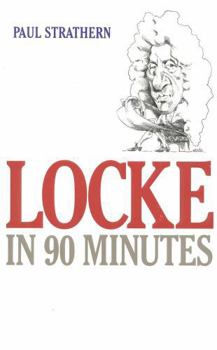Locke in 90 Minutes
(Part of the Philosophers in 90 Minutes Series and Virgin Philosophers Series)
Select Format
Select Condition 
Book Overview
"Each of these little books is witty and dramatic and creates a sense of time, place, and character....I cannot think of a better way to introduce oneself and one's friends to Western civilization."--Katherine A. Powers, Boston Globe. "Well-written, clear and informed, they have a breezy wit about them....I find them hard to stop reading."--Richard Bernstein, New York Times. "Witty, illuminating, and blessedly concise."--Jim Holt, Wall...
Format:Paperback
Language:English
ISBN:1566632625
ISBN13:9781566632621
Release Date:November 1999
Publisher:Ivan R. Dee Publisher
Length:91 Pages
Weight:0.26 lbs.
Dimensions:0.3" x 5.0" x 8.0"
Customer Reviews
2 ratings
A beneficient philosopher
Published by Thriftbooks.com User , 19 years ago
Strathern tells in his usual humorous and fast- paced way the life of Locke, and provides his own take on Locke's thought. For Strathern Locke is one of the political thinkers who has done the most good. There is much to be said for this view as the emphasis in Locke on individual rights, on tolerance, on liberty are a major influence on the US Declaration of Independance and Constitution. Locke also has a decisive influence on the philosophical tradition and turns it away from Aristotlian scholaticism toward learning through experience. In his great work an 'Essay on Human Understanding' Locke analyzes the way we come to know the world. He suggests quite in contradiction to what is believed today, that the mind is a tabula rasa a blank slate at the outset of life upon which experience freely writes. We today have more a sense of the inherent structures of the mind, linguistically and cognitively. Locke's analysis of the 'impressions and ideas' we have in terms of our apprehension of the primary and secondary qualities of objects is based according to Strathern on the difference between the measurable and non- measurable qualities, and is thus related to the rise of scientific investigation during Locke's lifetime. From Locke would of course follow Berkeley and after this the true demolition job of Hume. From the imperfect knowledge of the world through experience in Locke there would come in Hume a questioning of our ability to confidently know anything at all. Locke is not one of the most brilliant of the great philosophers, but nonetheless one of the most influential. Strathern does an excellent job of telling us how this is so.
John Locke: His life and his philosophy, served fast
Published by Thriftbooks.com User , 23 years ago
This book sets as its goal to communicate the life and work of John Locke in 90 minutes. For me, the book succeeded in this; I read it in about an hour and then went back over some parts to review in more depth. John Locke (1632-1704) was an important philosopher; he laid the groundwork for liberal democracy and he was also the founder of empiricism. Strathern spends most of the book describing different events in Locke's life and for non-specialist, this is probably a good approach. Strathern does a fairly good job of putting Locke in his historical context; grew up during the English Civil War, and then lived through Oliver Cromwell's rule and then the Restoration of the Monarchy; one of the more turbulent periods in English history, no doubt. I think Paul Strathern is a British writer and this comes through in his writing.Strathern is fond is saying that Locke's philosophy was "common sense." However, empiricism (The view that experience, especially of the senses, is the only source of knowledge) is not really self-evident and wholly obvious. Locke also presumed that when one is born, one is a tabula rasa (The mind before it receives the impressions gained from experience. The unformed, featureless mind in the philosophy of John Locke.) or a blank slate. I think that everybody has some innate ideas (things that you just know apart from experience). On occasion, it appears that Locke is a materialist (materialism: The theory that physical matter is the only reality and that everything, including thought, feeling, mind, and will, can be explained in terms of matter and physical phenomena) but this is incompatible with his philosophy. Surely, empiricism is a non-physical thing; how much does empiricism weigh? What is its volume? It is non-physical. As a philosophy of epistemology (The branch of philosophy that studies the nature of knowledge, its presuppositions and foundations, and its extent and validity), I think empiricism is seriously flawed.Locke's political thought probably had more impact on the world than his epistemology. Locke believed there is a natural law that gives people certain rights; for example the right to life or the right to liberty. However, because people keep stepping on other people's rights, it is necessary to form some sort of social contract (i.e like the American Constitution). Locke also held that certain rights are inherent and that if a government should act to violate those rights, then the people are justified in starting a revolution against those in power. Locke believed that Government had no legitimacy except the consent of the people (near the end of the 1700's, this would result in a paradigm shift from the Divine Right of Kings, to a Government by the People). One the most interesting passages (I don't agree with his evaluation of Kant thought) describes several centuries of European philosophy: "Without Descartes there might have been no modern philosophy. But it was Locke who fathered the main line of






